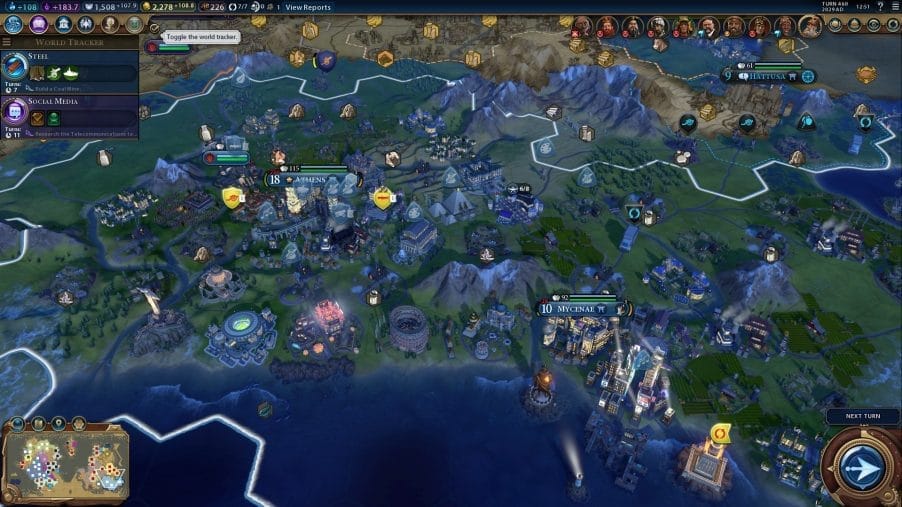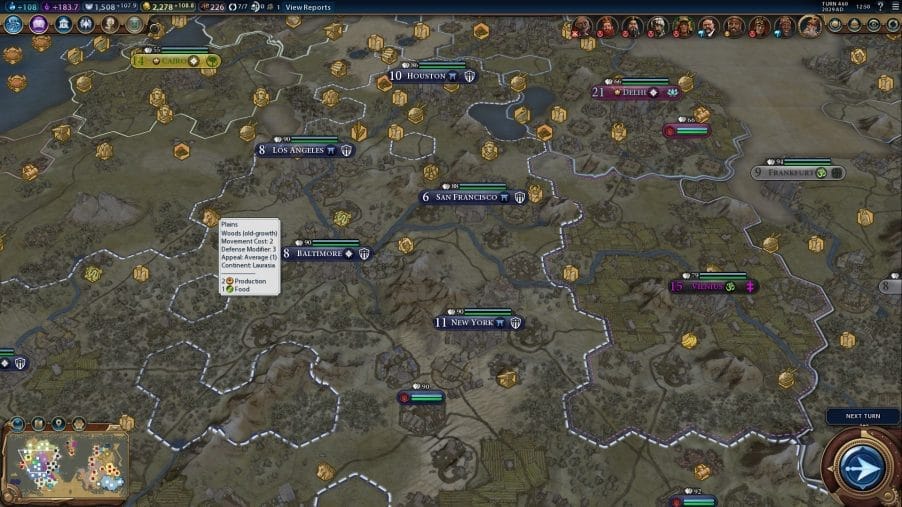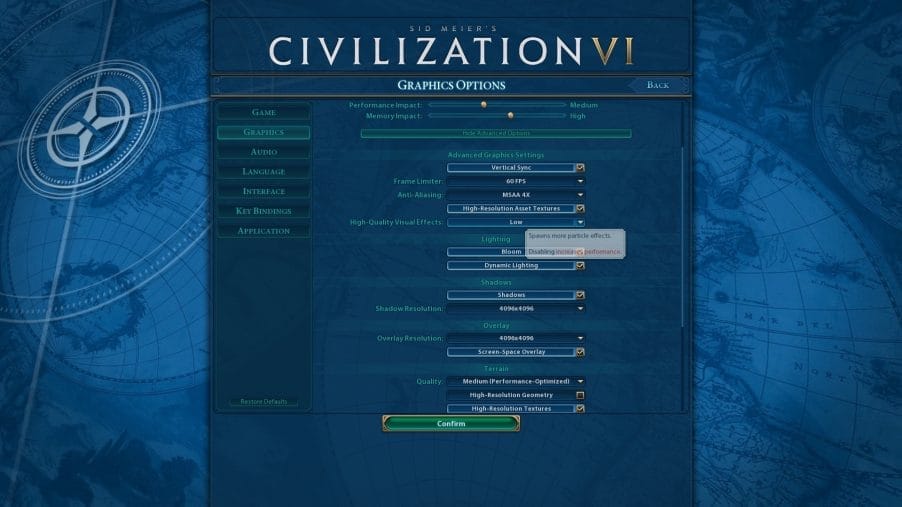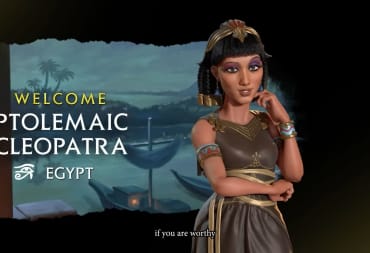There aren't many games that slurp up all my time and attention in quite the same way as Sid Meier's Civilization. I've not been with the franchise for very long (my first entry in the franchise was Civilization V with the Gods & Kings expansion) but already it's cemented itself as a franchise I eagerly return to time after time. Knowing this, it's easy to imagine how excited I was when Firaxis Games announced that they were working on a new entry in the series after the somewhat disappointing Sid Meier's Civilization: Beyond Earth, which was a game that missed the simple charm that comes with playing as a civilization from our own history. So, now that Civilization VI has been out for a few weeks it might be a good time to convert my 50+ hours with the game into a written form. Friendly reminder that this is not a review so there won't be a score at the bottom of the page, as doing a full review under our policy would mean playing all civs and that would take months. So, without any further ado, let's get into it!
Sid Meier's Civilization VI does an earnest attempt at delivering a full-fledged vanilla version of the game that does not seem to be lacking in features. This is already a step up from the release of V, which needed a couple of expansion packs in order to become truly serviceable. No such problem with Civilization VI. The base game already includes trading and religion in addition to a ton of new gameplay features and reworked mechanics from the older titles in the series.

The biggest new addition to the game is that the cities are now unstacked as opposed to being on one tile. This mechanic (which will probably look familiar to people who have played Endless Legend) needs you to be extra careful with what you build in your cities. Some districts give your city a ton of boosts if placed in the right spot next to tiles that yield specific resources, and every district acts as a sort of hub for specific kinds of buildings. The aqueduct district, for instance, can only be built next to a city center and has to have access to a fresh water source like a river or a lake. Another example would be Holy Sites, which generate more faith per turn if it's placed next to a mountain or a natural wonder. The unstacking mechanic makes managing your cities a little harder at first, but you'll be min-maxing your empire like there's no tomorrow once you've got the hang of it.
Managing your city is most definitely a pleasure, not in the least because of the new art style that commits to the boardgame feel that Civilization always had and sprinkles on top of that a wide range of beautiful visual effects that are both colorful as well as intricately detailed. The hexagonal fog of war from the older titles is also gone, replaced this time around by a map which slowly gets colored in as you explore more of the map's terrain. Once you've uncovered a piece of the map you will always be able to see the buildings and resources on those tiles regardless of you having any units in the area, but you won't be able to see units and vehicles on the map if you don't have a unit there. This presentation works really well for the game and makes the entire experience look a lot better as a result.

Remember global happiness in V? That's gone this time around. Instead, you'll have to make sure that each individual city is kept as happy as possible by providing the local populace with enough amenities, which are acquired through luxury resources or specific reformation beliefs in your religion. Food is also needed to promote growth, and you can upgrade a city's capacity by building districts and buildings that provide your cities with enough room to grow. I really like this mechanic better than the global happiness statistic in the previous game, which sometimes made it a little harder to find out why your empire wasn't being as productive as it should be.
[gallery type="slideshow" ids="111578,111577"]
A feature that has been given a rather dramatic rework has to do with how you unlock new tech. This time around you have two paths you'll take as you move through the ages. The familiar tech tree is still there and you still need science to unlock it faster, but a semi-new feature is the civics tree. You may remember the social policies from Civilization V that got you small bonuses you could unlock with your culture output. While the new system is similar in some ways, the way it's applied most certainly isn't. When you unlock new civics you'll be given a bunch of cards with modifiers (100% adjacency bonuses for districts, bonuses for trading with empires, that sort of thing) which you can use in the new Government mechanic.
Another new addition to VI is leader agendas. Every AI-controlled player gets two agendas (you get certain bonuses when you play certain leaders as well, although those bonuses aren't really part of your agenda): one based on the leader's historical personality and a hidden agenda you can find out by having good relations with the civ in question. These agendas shape the leader's personality towards you and other players, and should make their personalities easier to work with if you're looking to become buddies with a specific civ. Alas, at the time of writing this the leader agendas seem to factor in a bit too heavily in the political grand scheme of things, something which usually ends in endless waves of denouncements because you accidentally did something that was against their agenda.
[gallery type="slideshow" ids="111581,111583,111584"]
Take Montezuma, the Tlatoani leader. Montezuma likes civs who have the same kinds of luxury resources as he has but dislikes civs who have more luxury resources than he does. Because I founded my first city on a place surrounded by all kinds of luxury resources, Montezuma felt a denouncement and a war would be the correct response to me having more sugar than he does. Make no mistake, I love sugar as much as the next men or woman but I wouldn't plunge my civ into a hundred year war because someone else's biscuits taste somewhat sweeter.
Another example I can think of happened in my second game and involved the American civ led by one of the biggest badasses in semi-recent history: Teddy Roosevelt. He has the 'Big Stick Policy' as his main agenda which means he dislikes civs who start a war on the same continent as him. It just so happened to be that I shared my continent with both him and the Scythian civ, which is a civ that likes to wage war against basically anyone unfortunate enough to encounter them. America was having none of it and proposed a joint war to me so we could shut the Scythians down before they got the really dangerous tech in later eras. So it was decided, and so it came to pass. It was a relatively short war and before we knew it we had vanquished the nasty upstart nation and returned the land to the peace we were all enjoying so much. But, as it turned out, in helping America I accidentally went against his agenda of peace on his continent and I got denounced and attacked by Roosevelt for being a warmonger. Right. Okay then. It doesn't diminish the fun I was having with the game in any meaningful way, but I do hope that a patch that tones down the general insanity of the AI is coming before long, or else it might turn me, and many others, off the game if it's left without a fix. I don't mind aggressive civs in the slightest, I just want to understand why they do the things they do so I can react accordingly.

On a tchnical level, Civilization VI has a few options for you to play around with to get the best performance out of your system. Things like anti-aliasing and particle effects can all be tinkered with, and options to tweak the shadows and textures are also present in the game. Outside of the options menu, the game runs fine for me with some settings reduced, and you'll be getting similar performance if your CPU is up to scratch. Even so, the time between turns gets progressively longer the further along you are, but this is probably something you were expecting if you've played any of the older games before.
Based on my time with the game, I'd say that Firaxis really worked hard to make Civilization VI feel like a completely new chapter. Some of the changes, like the way cities work in VI, make some sweeping changes to the way you interface with them, and the game is more compelling than it ever was as a result. With the exception of the awful AI present in the game at launch, most of the features hit their mark competently. The game is a lot of fun even in its current state and with its problems, and I'm hopeful that they'll introduce a range of new features and fixes before long. Their choice of hiring Sean Bean to do the narration was also a great choice, in my humble opinion. Then again, I've got a soft spot for Northern English accents.
Sid Meier's Civilization VI was played on PC via Steam (Affiliate) with a copy purchased by this reviewer.
Have you played Sid Meier's Civilization VI? What do you think of the game so far?
Previews you can trust: To ensure you're getting a fair, accurate, and informed review, our experienced team spends a significant amount of time on everything we preview. Read more about how we review games and products.
Have a tip, or want to point out something we missed? Leave a Comment or e-mail us at tips@techraptor.net












